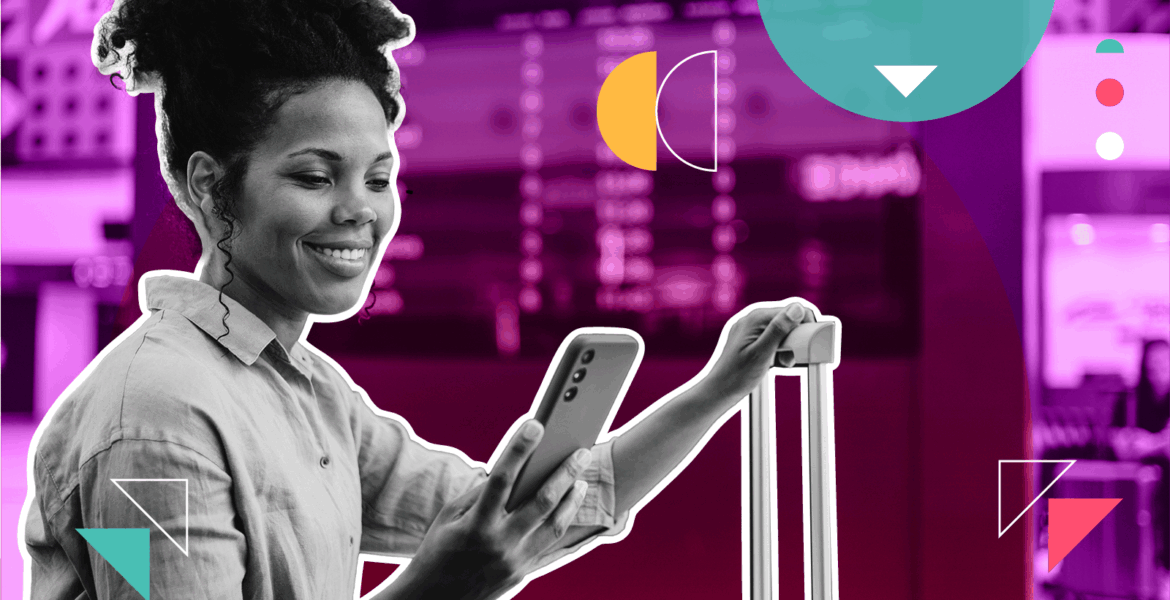By Ludovic Gougat, CMO at RAPP
I was stuck at SFO with cranky kids, our flight delayed by six hours due to storms, when my phone chimed with a notification. It was from our hotel’s app: “We noticed your flight delay, Ludo. We’ve extended your check-in until midnight, and stocked your room with those Kinder chocolates your children love. A late dinner menu is ready for room service whenever you arrive.” I hadn’t alerted them or mentioned my children’s preferences; their AI had monitored my flight status, referenced my family profile, and orchestrated exactly what would ease our stress. That moment—when my travel nightmare suddenly felt manageable—transformed me from a points-collector to a genuine brand advocate.
The travel industry may have pioneered loyalty programs, but decades in, points and perks have become interchangeable. Travel loyalty program membership is at an all-time high, with 95% of brands now offering travel rewards (a 20% increase since 2021) and 84% providing travel booking capabilities, up 23 percentage points in the same period. When everyone offers similar tiers and perks, the tie-breaker isn’t the reward. It’s the recognition. Loyalty in travel has shifted from the transactional to the emotional, where personalization becomes the new currency of retention.
Creating that emotional resonance depends on how brands show up in the real moments travelers experience—from pre-trip planning and the chaos of a delay to the subtle touches that make a stay feel seamless. Today, AI enables travel companies to move beyond generic engagement and create meaningful micro-moments that drive true loyalty. It’s not about just streamlining service; it’s about anticipating needs before the traveler even thinks to ask.
AI’s role in shaping loyalty has grown as travelers become more comfortable trading data for personalization. According to the 2024 Barclays Travel Rewards and Loyalty Report, the most sought-after loyalty program benefits are the ability to earn and redeem rewards, lower costs, and status perks like free checked bags, priority boarding, and upgrades—benefits that go beyond points and make travelers feel recognized and valued. This shift is especially pronounced among younger travelers, who are less loyal to a single program and more likely to shop around for the best personalized experience.
Some brands are already getting this right. Marriott Bonvoy, for example, surpassed 230 million members as of early 2025. Hilton Honors has grown to over 210 million members, expanding by 147% since 2018. This explosive growth is matched by a focus on personalization and digital engagement, with both brands investing heavily in AI-driven guest experiences. As Skift’s 2024 State of Travel Report notes: “AI and data are driving this shift, enabling travel companies to offer more customized experiences based on individual preferences, behaviors, and past interactions.”
Post-trip, companies are leveraging AI to foster continuity in loyalty. For instance, travel brands are increasingly using browsing and booking data to prompt travelers with timely, relevant offers—helping them feel remembered and understood, not just marketed to.
These examples are evidence that emotional loyalty, when powered by AI and grounded in good data, drives measurable business outcomes. In fact, Arrivia’s 2024 Travel Loyalty Outlook shows a major shift in program strategy toward increasing customer lifetime value and boosting overall program spend.
But building this kind of loyalty requires more than technology. It requires intentional design around emotional impact. One strategy is to start by mapping the traveler journey and identifying moments with emotional stakes—a booking confirmation, a family arrival, or a trip wrap-up. Those touchpoints are where personalization hits hardest.
To support that, brands need unified traveler profiles that combine booking history, on-property behavior, feedback, and digital signals. From there, AI tools can predict and automate customized messages or service changes. It’s also critical to equip frontline staff with those insights. Even the best personalization loses value if it’s confined to the app experience. Human interaction, backed by AI-generated context, turns a brand from a service provider into a trusted partner.
Emotional loyalty also requires a new lens on measurement. Instead of tracking only redemption rates or status upgrades, marketers should look at indicators like Net Promoter Score, repeat booking value, and social advocacy. These are the metrics that reveal engagement as well as attachment.
If I had to offer one recommendation to travel marketing leaders, it would be to choose a single emotionally charged touchpoint in your traveler journey and invest deeply in personalization there. Test it against your standard approach. Measure how it shifts both satisfaction and long-term retention. Sometimes a single, well-crafted moment is all it takes to turn a casual customer into a lifelong advocate.
I don’t remember how many points I earned from that Paris stay, but I vividly recall the feeling of being known and cared for when it mattered most. In travel, where the experience is the product, those are the moments that matter. AI can’t create loyalty on its own, but when it’s used to create meaning, it changes everything.
About the Author
Ludovic Gougat, CMO at RAPP, combines left-brain analytical thinking with right-brain creative sensitivities to build effective marketing strategies for his clients. Ludo held strategy positions at WPP, IPG and Omnicom, where his work won Global Effies and DMA Echo Awards for business effectiveness. He graduated from a business school in Paris, where he is from.











